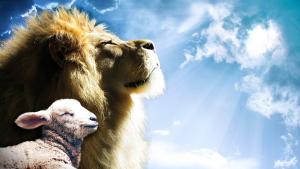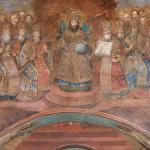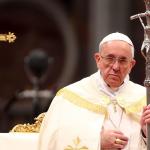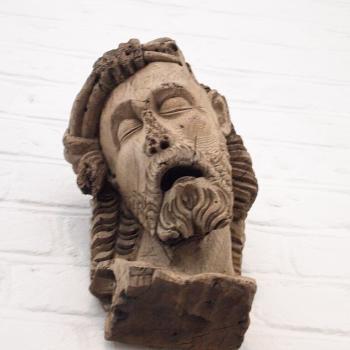
Paul believed that Christ’s work on the cross was not just for but for the whole of creation. All things are brought together and made one. The whole of created being is brought together and shown to be one. God became not just a man, but a creature, a part of created being, so that all that has been created can be raised up and partake of the eternal kingdom of God. “For in him all the fulness of God was pleased to dwell, and through him to reconcile to himself all things, whether on earth or in heaven, making peace by the blood of his cross” (Col. 1:19-20 RSV).
Sin corrupted the goodness of being, dividing it into warring parts; in Christ, they are reconciled with one another, the taint of sin is removed, and then they are lifted up to God wherein they experience the glory of the presence of God and his deifying God. God truly is rendered all in all (cf. 1 Cor. 15:28). St. Maximos the Confessor explained this truth by explaining how Christ is said to recapitulate all things in himself:
And He recapitulates all things in Himself, for it is owing to Him that all things exist and remain in existence, and it is from Him that all things came to a certain way, and for a certain reason, and (whether they are stationary or in motion) participate in God. For by virtue of the fact that all things have their being from God, they participate in God in a manner appropriate and proportionate to each, whether by intellect, by reason, but sensation, by vital motion, or by some essential faculty or habitual fitness, according to the great theologian, Dionysius the Areopagite. [1]
Sin affects the order of being. Not only was humanity degraded by sin, the whole of creation bears the burden of this corruption. This is in part because of the interdependent relationship between the parts of creation itself. This interdependent connection between all things, combined with the natural abilities of humanity itself, gives humanity great power and influence over the rest of creation. The evil which is done by humanity harms not just humanity, but the whole of creation. Nonetheless, there must also be understood that all sentient beings in creation also have their own potential to disengage themselves from their authentic nature and sin. Sin corrupts nature, and those who undermine their proper nature sin.[2] This is why, Paul said that creation was waiting for the liberation which would be had in Christ (cf. Rom. 8:19-21), for with the revelation of the children of God there is the revelation of deifying grace, grace which not only heals the harm done by sin, but also the grace which liberates all things from the bondage of sin.
From this, it is possible to understand the Gospel as presenting the peaceable kingdom, that God’s will be done on earth as it is in heaven. It is not just about some justification of humanity through some sort of legal fiction that brings some people to salvation; rather, it is about the transformation of nature, the indwelling of grace, the deification of creation, so that through such transformation, the evil which has been done to creation can be overcome. Humanity is called to represent God to the world, as priests of this peaceable kingdom, and as priests of the prince of peace, they are to offer the Gospel of peace to all, as Andrew Linzey suggested: “At the heart of the Christian Gospel is the dream of universal peace, a world where humans are no longer violent and cruel to other creatures.”[3] This is, one could say, the prophetic vision of the prophet Isaiah:
The wolf shall dwell with the lamb, and the leopard shall lie down with the kid, and the calf and the lion and the fatling together, and a little child shall lead them. The cow and the bear shall feed; their young shall lie down together; and the lion shall eat straw like the ox. The sucking child shall play over the hole of the asp, and the weaned child shall put his hand on the adder’s den. They shall not hurt or destroy in all my holy mountain; for the earth shall be full of the knowledge of the LORD as the waters cover the sea (Isa. 11:6-9 RSV).
In the eschatological kingdom, the violence seen in nature, just as the violence of humanity, shall be overturned by the deifying grace of Christ. All things are to come together, no longer warring against each other, but in a loving embrace. This is what the eschaton is to bring; this is what we pray for when we ask God’s will be done on earth as it is in heaven; this is what we are called to act upon and help bring about in the world. We must look at ourselves as responsible for the well-being of creation; we must find a way to transform it so that the damage done by sin can be overcome, starting with our own sin, and our own failed integration with the rest of creation as a result of our sin. Our relationship with plants, animals, indeed the whole earth must be transformed, so that we act according to the prophetic vision of Isaiah instead of the way sin has defined our relationship with the world in the past.
This can be demonstrated in the way Jesus acted within the Gospels. Andrew Linzey explained that in his historical life, Jesus showed us new possibilities for creation, new ways for nature to manifest itself; by bringing his grace to creation, Jesus overcomes many of the deficits it suffers as a result of sin:
For the revelation of God in Jesus is such as to intensify rather than diminish the puzzle of the created order. For Jesus stands against as much as for the order of nature as we know it. The natural processes of sickness and death and disease, even indeed, the vagaries of the weather, are subject to the power of God in Jesus Christ. If we follow Jesus we are set upon a course of trans-natural transformation whereby the sick do not suffer and die but are healed and restored; the poor are not downtrodden but become the first among equals; and even the winds which blow us to the four corners are gathered together. The so-called ‘nature-miracles’ of Jesus are signs among many that in Jesus is a birth of new possibilities for all creation. [4]
Instead of seeing the nature miracles as a demonstration of power and control over nature, Linzey gives us an authentic Christian vision where nature is raised up and made better through Christ. This is what we should see in ourselves. We must continue Christ’s work with creation. We should be vessels of grace, continuing to bring what creation needs for its proper integration into the eschatological kingdom of God. Sacramentals like holy water present one way this manifestation of grace is made known to us, but of course, this is not the only way. A new awareness and awe for the glory of creation, a new way of interaction with creation, where we longer look at it as something to control and dominate but rather, as something to be set free with us so it can be filled by the glory of God, is exactly what we need. This might mean we need to question our own historical actions with nature. Should we not strive for the pristine relationship suggested by the creation texts of Genesis? In Genesis, it is clear, humans were given food to eat, but the food was not the flesh of animals:
And God blessed them, and God said to them, “Be fruitful and multiply, and fill the earth and subdue it; and have dominion over the fish of the sea and over the birds of the air and over every living thing that moves upon the earth.” And God said, “Behold, I have given you every plant yielding seed which is upon the face of all the earth, and every tree with seed in its fruit; you shall have them for food. And to every beast of the earth, and to every bird of the air, and to everything that creeps on the earth, everything that has the breath of life, I have given every green plant for food.” And it was so (Gen. 1:28-30 RSV).
It was after sin had greatly hindered humanity, after humanity has completely wrecked creation itself (as represented in the story of Noah), that we see permission was given for meat-eating:
It is in this context—subsequent Fall and the Flood – that we need to understand the permission to kill for food in Genesis 9. It reflects entirely the situation of the biblical writers at the time they were writing. Killing – of both humans as well as animals – was simply inevitably given the world as it is and human nature as it is. Corruption and wickedness had made a mess of God’s highest hopes for creation.[5]
We can accept that circumstances create conditions in which the only options which exist are less than ideal. Just war theory can be read as a kind of economia for war: it does not say war is good, but only that, in a particular circumstance, not engaging a defensive war is actually worse. The same, then, can be said in relation to meat-eating. It is not ideal. Scripture presents it only as an option after a secondary fall for humanity. But even then, those who want to be righteous, should take care. “A righteous man has regard for the life of his beast, but the mercy of the wicked is cruel” (Prov. 12:10 RSV). The transformation which we see in Christ is supposed to transform us away from the necessities caused by sin. This is why Christian vegetarianism, even if it is not required, represents a virtue which presents an authentic response to God’s eschatological intention for his creation. On the one hand, as sin and with it, necessity, can be seen as establishing terrible options for humanity, it is understandable that the permission to eat might remain, but on the other hand, as grace transforms nature and purifies humanity (personally and communally), it is understandable why this permission should not be seen as representative as ideal. In reality, the ideal is that which was presented in the creation narrative of Genesis and in the eschatological vision of Isaiah, where such necessity not only has been put away but no such predatory nature will remain. Christians seeking to live out and experience the kingdom of God can engage the grace of Christ and find ways to integrate and live out the kingdom of God now. Where authentic opportunities for a vegetarian lifestyle has emerged, Christians should consider whether or not they want to continue to live under the bondage they lived in by sin or if they should seek out a better way of life, one which demonstrates their peaceable mission to the world. For those who can’t, those who are not ready for this transformation, they should at least consider doing what they can to limit any harm due to the necessities which burden them.
In Christ, all things are to be transformed. In Christ, we find all things are taken up to the glory of God. As we find ourselves joined to the life of Christ, as we find ourselves one with the body of Christ, we are to live out the restorative work of Christ, seeking therefore to act as priests within him, rendering the whole of nature over to God. Nature is not something which we should seek to control or dominate, but rather, something which we liberate, so that in its freedom, it is free to partake of the grace of God and likewise be lifted up and incorporated into him. We reveal ourselves to be children of God when we, at last, live out our proper vocation in the world, when we become mediators of grace, looking no longer for our own selfish benefit but for the well-being of the world. We must do more than pray God’s will be done: we must mean it, living it out in deed and not just in word. We must be sensitive to the goodness of God’s creation, working not only to preserve it, but to lift it up to God’s deifying grace, letting God’s glory truly shine.
[1] Saint Maximos the Confessor, On Difficulties in the Church Fathers: The Ambigua. Volume I. Trans. Nicholas Constas (Cambridge: Harvard University Press, 2014), 97 [Amb. 7].
[2] It is possible to transcend nature by rising above it through God’s deifying grace: this is not what is meant by undermining nature.
[3] Andrew Linzey. Animal Gospel (Louisville, KY: Westminster John Knox Press, 1998), 71.
[4] Andrew Linzey, Animal Theology (Chicago: University of Chicago Press, 1995), 87.
[5] Andrew Linzey, Animal Theology, 127.
Stay in touch! Like A Little Bit of Nothing on Facebook.
If you have liked what you read, please consider sharing it with your friends and family!













